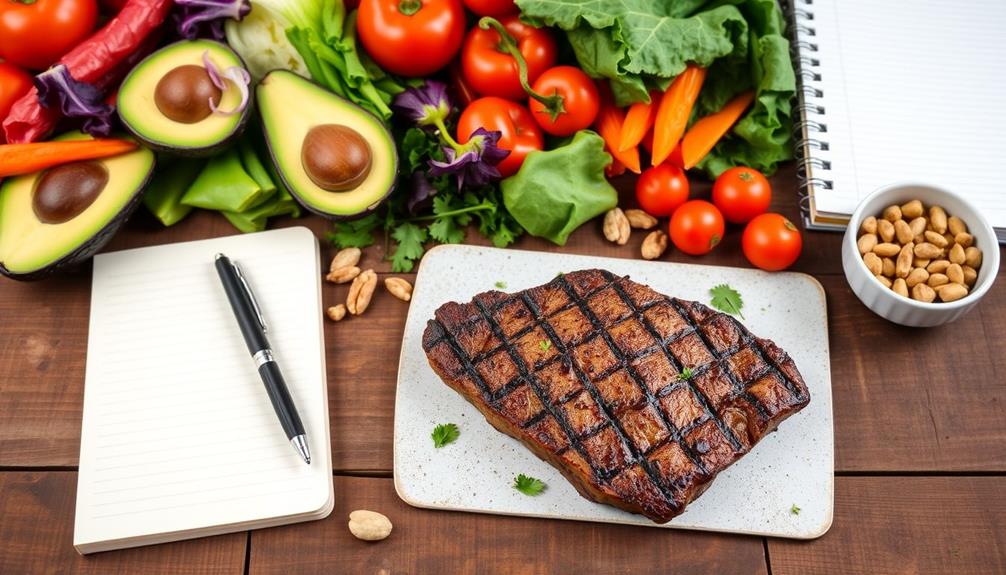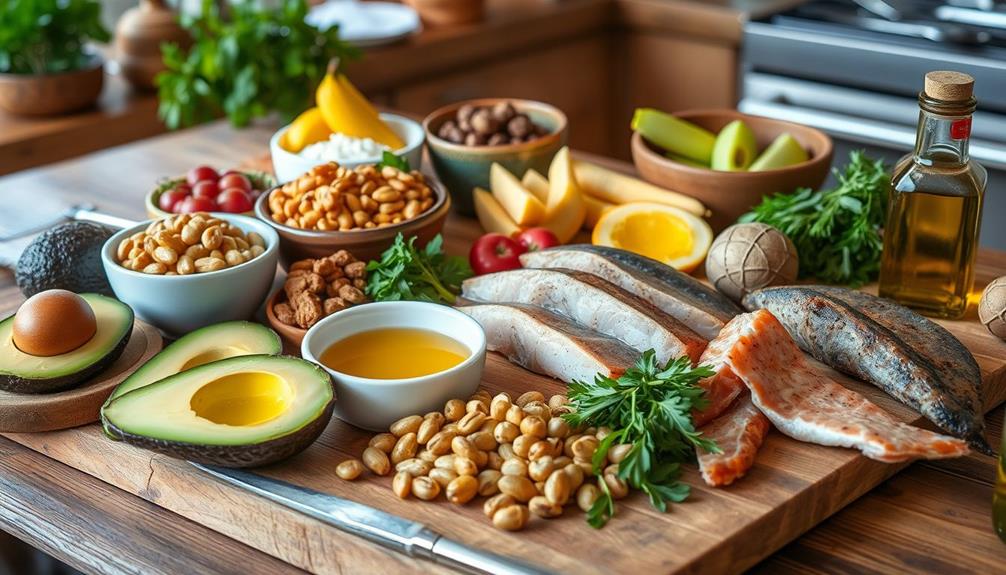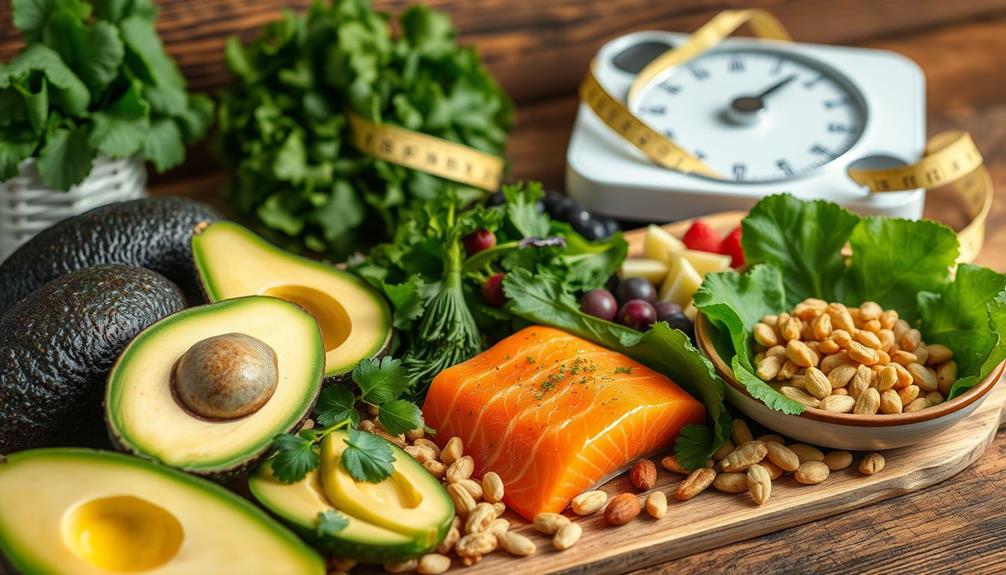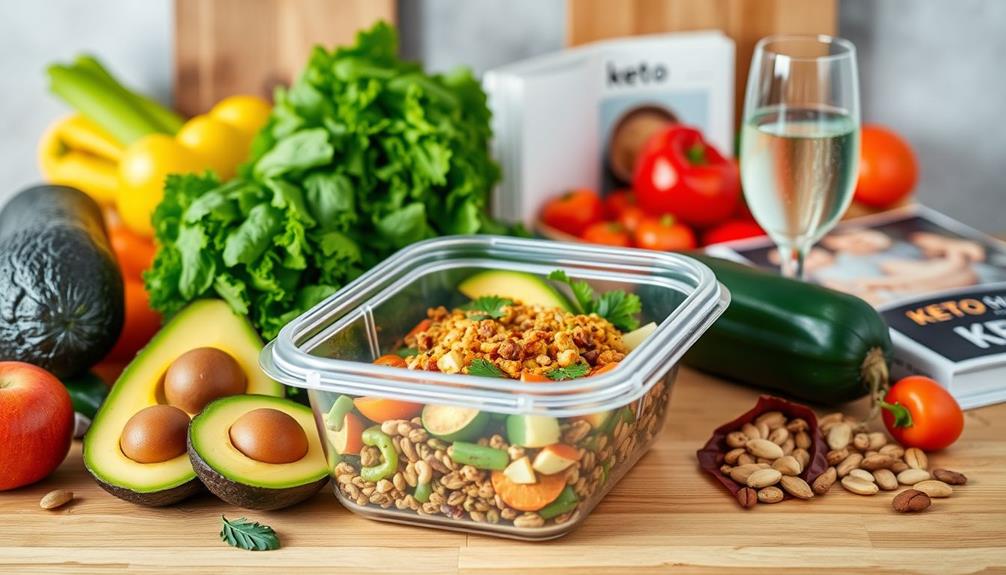Accessing the keto diet hinges on your understanding of nutrition's role. You'll need to shift your metabolism from carbs to fats, focusing on reducing carbs while increasing healthy fat intake. Aim for 20-50g of carbs daily, with fats making up 70-80% of your calories. Tracking your macronutrients with apps can keep you on track. Pay attention to essential nutrients, including magnesium and potassium, to avoid deficiencies. Supplements can fill in gaps, but prioritize whole foods. With smart meal planning and hydration, you'll master keto. Keep going to discover more tips and strategies for long-term success. To stay on track with the keto diet, it’s important to find creative and delicious ways to incorporate healthy fats into your meals, such as avocados, nuts, and olive oil. Meal prepping can also be a helpful strategy to ensure you have keto-friendly options readily available, especially when on the go. Experiment with different recipes and cooking methods to keep your meals interesting and satisfying. These are just a few strategies for keto success that can help you stay committed and achieve your health and wellness goals.
Key Takeaways
- Maintain a low carb intake (20-50g) while maximizing healthy fat consumption (70-80% of calories) for effective ketosis.
- Use nutrition tracking apps like MyFitnessPal to monitor macronutrient intake and stay accountable.
- Incorporate nutrient-rich foods such as avocados, nuts, and fibrous vegetables to prevent deficiencies in key vitamins and minerals.
- Consider supplements for magnesium, potassium, and B vitamins to fill potential dietary gaps while on the keto diet.
- Plan meals ahead to manage cravings and ensure variety, supporting long-term adherence to the ketogenic lifestyle.
Understanding the Keto Diet

What makes the keto diet so effective? It's all about shifting your metabolism from burning carbohydrates to burning fats.
By drastically reducing your carb intake and increasing your fat consumption, you enter a state called nutritional ketosis. In this state, your body starts producing ketone bodies, which serve as an alternative energy source.
This process not only promotes fat burning but also stabilizes your insulin levels, reducing the risk of metabolic syndrome. You'll likely experience better appetite control and an improved metabolic rate, making your weight loss journey more manageable.
Plus, the focus on high-fat foods can keep you satisfied longer, helping you resist those pesky cravings for sugary treats.
Embrace this transformative approach to nutrition!
Nutrition Tracking Essentials
Tracking your nutrition is a key component of succeeding on the keto diet. By monitoring your macronutrient intake, you can guarantee you stay within your carb limits while maximizing healthy fats and proteins. Using apps like MyFitnessPal or Cronometer simplifies this process.
Here's a quick reference table to help you get started:
| Nutrient | Ideal Daily Intake |
|---|---|
| Carbohydrates | 20-50 grams |
| Fats | 70-80% of calories |
| Proteins | 20-25% of calories |
| Fiber | 25 grams |
| Water | 2-3 liters |
Regular tracking helps you make informed food choices and adjust your diet as needed, ultimately supporting your keto journey for lasting results.
Key Nutrients and Deficiencies

While following a keto diet, it's crucial to focus on key nutrients to guarantee you're meeting your body's needs and avoiding deficiencies.
Prioritize healthy fats from avocados, nuts, and olive oil, along with quality protein sources like grass-fed beef and free-range poultry.
Don't forget to add fibrous vegetables to your meals for essential vitamins and minerals.
Common deficiencies on a keto diet include magnesium, potassium, and certain B vitamins, which can cause fatigue and muscle cramps.
To prevent these issues, keep a food diary to track your nutrient intake.
Make proactive dietary adjustments, ensuring your meals are balanced and nutrient-dense, which can help you maintain energy levels and overall wellness throughout your keto journey.
Importance of Supplements

To maintain ideal health on a keto diet, supplements can play an important role in addressing potential nutrient gaps and supporting your body's needs. Since the keto lifestyle can lead to deficiencies in key nutrients like magnesium, potassium, and B vitamins, incorporating high-quality supplements helps mitigate these risks.
Additionally, cold medications overview provides insights into managing health effectively during seasonal changes. Electrolytes are particularly important, as they support hydration and muscle function. Multivitamins can fill in any dietary gaps, ensuring you're getting essential nutrients.
Moreover, omega-3 fatty acids promote heart health and help reduce inflammation. When choosing supplements, prioritize reputable brands and scrutinize labels for quality. By proactively addressing these nutrient needs, you'll enhance your keto experience and maintain peak health throughout your journey.
Long-term Keto Success Strategies

Achieving long-term success on the keto diet hinges on a balanced approach to nutrition that prioritizes whole foods and hydration.
To maintain your progress, listen to your body and respond to its hunger signals. Incorporate a variety of healthy fats, quality proteins, and fibrous vegetables into your meals to prevent dietary monotony and nutrient deficiencies.
Meal planning is vital; it helps you stay ahead of cravings for high-carb foods. Remember, flexibility is key—don't be afraid to adjust your meals based on how you feel.
Regularly tracking your macros and micros will keep you informed and motivated. Finally, consult with healthcare professionals as needed to tackle challenges and guarantee you're on the right path for sustained keto success. You can also consider using a food diary or app to help you stay on track with your nutrient intake. Additionally, focusing on nutrient-dense foods, such as lean proteins, leafy greens, and healthy fats, can help you get the necessary nutrients for weight loss while following a keto diet. Remember, it’s important to listen to your body and make adjustments as needed to ensure you’re getting the right balance of nutrients for your individual needs.
Frequently Asked Questions
Can I Eat Fruit on a Keto Diet?
Yes, you can eat fruit on a keto diet, but focus on low-carb options like berries. Limit portions to stay within your carb allowance, and always track your intake to maintain ketosis effectively.
How Do I Deal With Keto Flu Symptoms?
To deal with keto flu symptoms, stay hydrated, replenish electrolytes, and guarantee adequate rest. Eating nutrient-dense foods can help alleviate fatigue. Gradually adjusting your carb intake can ease the shift into ketosis.
Is Intermittent Fasting Compatible With Keto?
Studies show that combining intermittent fasting with a keto diet can enhance fat loss by up to 30%. You can effectively boost your results, improve insulin sensitivity, and simplify meal planning with this powerful pairing.
What Are Keto-Friendly Snacks?
For keto-friendly snacks, you can enjoy almonds, cheese sticks, or avocado slices. Hard-boiled eggs and beef jerky are great, too. Just remember to check the carb count to stay within your limits.
How Can I Eat Out While on Keto?
When dining out, think of it like a treasure hunt. You can savor grilled meats, salads, and healthy fats. Just ask for modifications, skip the bread, and enjoy the delicious options that fit your keto lifestyle!
Conclusion
As you embrace the keto lifestyle, remember that nourishment is your guiding star, much like Odysseus steering through the seas. By tracking your macronutrients, prioritizing quality foods, and considering necessary supplements, you'll not only conquer your weight loss goals but also cultivate a sustainable way of living. Let these strategies be your compass, guiding you toward long-term success and energy on your keto journey. Release your potential, and watch as your transformation unfolds.








